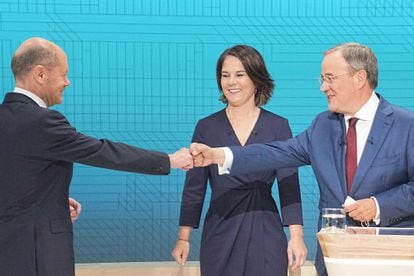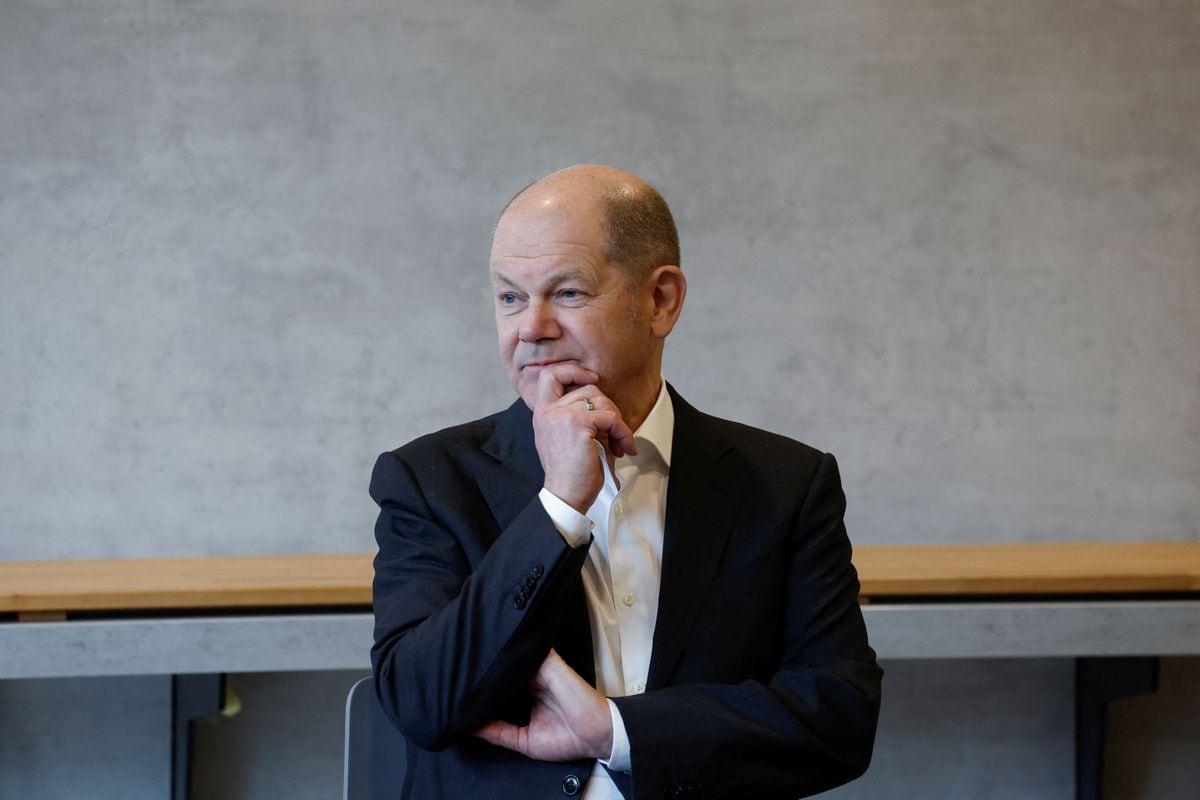Olaf Scholz (left), Annalena Baerbock and Armin Laschet greet each other before the second election debate on Sunday night on public television.MICHAEL KAPPELER / AFP
Olaf Scholz is on a roll. The Social Democratic candidate for the German elections won the second debate among the three candidates to succeed Angela Merkel at the head of the Chancellery. So at least the viewers pointed it out, who gave him the best score in almost every aspect: they found him the most competent, the most credible, the one who best presented their ideas. And this despite facing a rival clearly on the attack that in the first minutes of the debate, held on Sunday night, seemed to leave him speechless by chaining one accusation after another. Conservative Armin Laschet's offensive, sunk in the polls, was forceful. He took out all the artillery that in the previous debate he had not even mentioned, read the Wirecard and Cum-Ex financial scandals,occurred under the supervision of Scholz as Minister of Finance in Merkel's Grand Coalition Government. Scholz weathered the downpour without interrupting, then explained in that monotonous tone of voice that characterizes him.
More information
Merkel's party risks going into opposition
The 'red coalition' takes shape with Die Linke
Polls released over the weekend continue to give the Social Democrat a good margin of up to five percentage points. That is why Scholz went out to make no mistakes and to give the image of seriousness and stability that has worked so well for him so far. Laschet, on the other hand, was forced to attack. The moderation of the first debate did not work for him. The Greens' candidate, Annalena Baerbock, was also on the offensive but against her two contenders, whom she associates with the past and the status quo, in the face of the renewal that her party represents. He focused on reproaching them for their inaction after eight years of joint rule, and underlining the Greens' plans to combat the climate crisis. In the latest poll for the newspaper
Bild
, released on Saturday, the weather is the most important campaign issue for Germans. Two weeks before the elections, the SPD has a voting intention of 25.9%, compared to 21.1% for the CDU-CSU and 15.8% for the Greens, according to the average of several recent polls.
The first quarter of an hour was the most exciting. Afterwards, the meeting completely lost its rhythm and seemed more like a turn-based interview than a debate. All the unpleasant matters were aired at first. At times, Laschet seemed even too aggressive by the standards of German politics. In addition to the financial scandals, he brought out the record of the Prosecutor's Office in the Scholz Ministry - and in the Justice Ministry - last week, within an investigation into the alleged disinterest of a government office that pursues money laundering. Although it is clear that it does not directly affect the minister, Laschet insisted on his “vigilance responsibility” and released a phrase that seemed rehearsed:"If my Finance Minister [Laschet presides over the Land of North Rhine-Westphalia] worked like you do, we would have a problem." Scholz, of course, barely flinched. Phlegmatic, he simply told him that he was using "false premises" and that a responsible politician should not behave like this.
Foreign policy was practically absent from the debate. The moderators and the candidates preferred to focus on what happens within the borders of Germany. Europe and NATO were mentioned above, but only when Laschet again attacked Scholz about a possible coalition between Social Democrats, Greens and Die Linke, the post-communist party. As he did in the previous debate, he demanded that Scholz rule on whether he would agree with a formation that wants NATO to disappear and that criticizes various aspects of the European Union. Scholz avoided ruling out an alliance with Die Linke and said that the first thing is that the voters have their opinion on September 26. Analysts assure that the Social Democrats want to keep that door open to pressure the liberals of the FDP,the other hinge party with which Scholz could get a majority to govern with the Greens. At this point, and unless the polls are wrong, it is clear that a tripartite will be necessary. And that getting a three-way agreement could take months of negotiations.
Laschet stressed that he would not agree with the Die Linke left or with the far-right Alternative for Germany (AfD) party, which provoked the reaction of the other two candidates, who reminded him how "dangerous" it is to compare a democratic formation with another that "does not respect the Basic Law" German.
AfD is under surveillance by the German secret services for its radicalism and for going against the democratic order and all the parties maintain a strict sanitary cordon with this formation.
Laschet was also reminded during the debate that the CDU has a regional candidate, Hans-Georg Maassen, who is related to the ideological orbit of AfD.
Join EL PAÍS now to follow all the news and read without limits
Subscribe here
The moderators asked about the coronavirus crisis and what could have been done differently. Laschet said while pulling a mask out of his pocket that the most important lesson is the need to have a "European autarky", in the sense of not depending on third countries on strategic issues such as the manufacture of masks. His opponents did not take the opportunity to bring up the scandal of the commissions that several conservative deputies allegedly charged for acting as intermediaries in the purchase of face masks during the first wave of the pandemic. All three candidates encouraged Germans to get vaccinated. Only 62% of the population has the complete guideline, compared to 75% in Spain.
The climate crisis occupied much of the debate. Baerbock insisted that the Germans will have to decide between voting "more of the same" or voting for a party that wants to accelerate the energy transition, advancing the exit of coal, for example [scheduled for 2038]. "Germany can do much more," he stressed. One of the key questions is the cost of that transition, how much money is it going to cost taxpayers. In one of the questions, the moderator assumed that it will be "at least as expensive" as German reunification, something that scares many conservative voters. Laschet maintains that taxes will fall under a conservative government, while Baerbock assures that investments are necessary. Scholz was cured in health with this phrase: "The moderate way is the right way."
The candidates also spoke - in turns, without interrupting and with hardly any dialogue - about digitization, that pending issue in Germany. Baerbock gave Spain an example: “We have to do like them and say that it is a State task”. On the housing issue, Scholz and Laschet agreed that the main problem is that little is built. Scholz did not come out clearly in favor of a rent cap at the federal level as requested by various citizen initiatives that denounce the high price of rents. On the issue of taxes, the differences between the two were seen again. Scholz recalled that, according to the electoral program of the Conservatives, someone like him, with the salary of a minister, would have his taxes lowered. Laschet stressed that uploading them is "the wrong way".
The candidates will still face each other on television one more time before the elections, on September 19.
Follow all the international information on
and
, or in
our weekly newsletter
.









